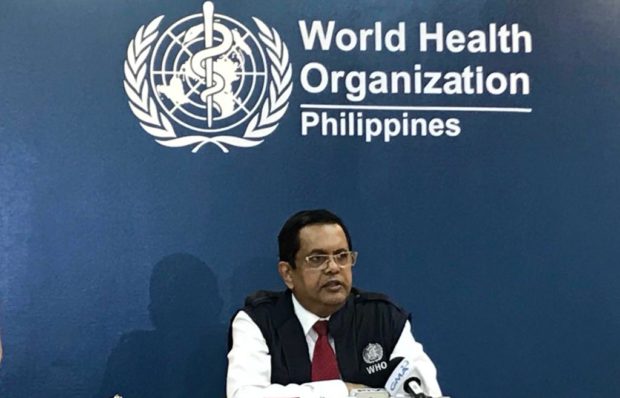MANILA, Philippines — For now, the World Health Organization (WHO) is “not seeing a need for population-level booster dosing” against COVID-19 except for immunocompromised individuals, its representative to the Philippines said Tuesday.
Dr. Rabindra Abeyasinghe reiterated that all COVID-19 vaccines in the WHO’s emergency use listing (EUL) are still effective in preventing severe disease and death.
“The evidence we have, looking very closely, is that all WHO EUL-listed vaccines still are effective in preventing severe disease and death. And the only exception to this is when those two doses have not been able to generate the required immunity because certain people have immunocompromised situations in their bodies and those people may require a third dose,” he said at the Laging Handa public briefing.
“When we talk about immunocompromised people, it may be the elderly, it may be people who have other immune problems that may require a booster dose. Besides that, we are not seeing a need for population-level booster dosing at this point in time,” he added.
The WHO has earlier called for a halt on COVID-19 vaccine boosters until at least the end of September amid the gap between vaccinations in wealthy and poor countries.

FILE PHOTO: Dr. Rabindra Abeyasinghe, WHO representative to the Philippines. INQUIRER/Cathrine Gonzales
Abeyasinghe stressed there remains a huge inequity to vaccine access globally. He noted that some of the most vulnerable people in other countries have not even had a single COVID-19 vaccine dose.
“In light of this, WHO is asking for a moratorium on booster doses, but let me also clarify what we mean by a booster dose. It means a third dose for people who have already received two doses of a vaccine, and really we don’t have the evidence that people who have already received two vaccine doses of WHO-approved, EUL-granted vaccines require a third dose,” he explained.
Nevertheless, Abeyasinghe pointed out that the discussion on administering booster doses is an evolving matter.
“This is an evolving situation, WHO is looking very closely with many of our research institutions and partner organizations to get better evidence, but in the interim, our current position is that since the vaccines are effective in preventing severe disease and death, it is important to address global inequity in access to vaccines,” he said.


